Connected Vehicles: 10 Ways How IoT Change the Automotive Industry
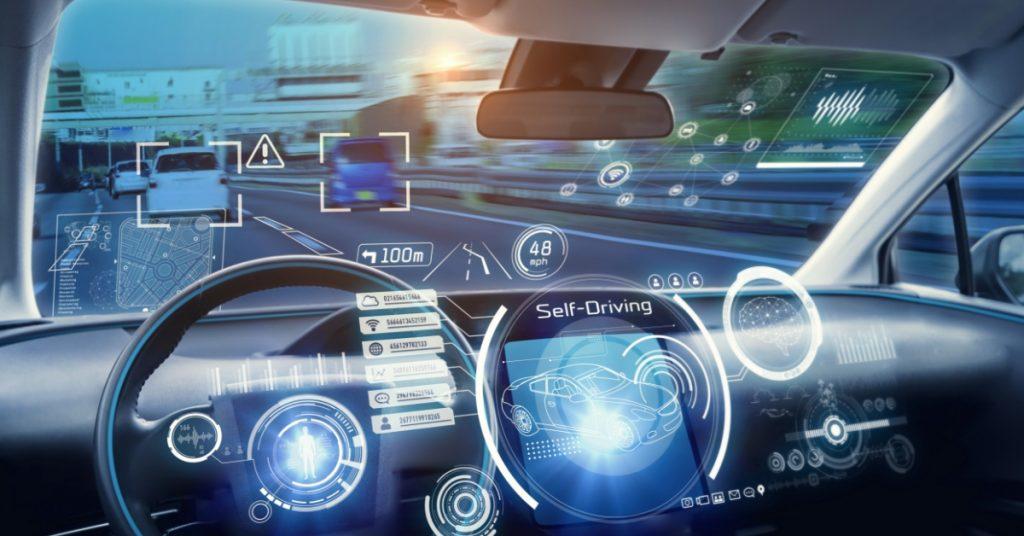
IoT technology is advancing swiftly and weaving smart connections into our lives.
The growth of IoT-connected devices is remarkable as everyday objects like devices, vehicles, and even homes become interconnected. This technology’s rapid expansion is reshaping how we live and interact with the world. Like the consumer appliances sector, the automotive industry is undergoing rapid changes because of the growth of Internet of Things (IoT).
So, how large is the market for IoT in the automotive industry?
According to Global New Wire, it is anticipated to rise from USD 131.2 billion in 2023 to a projected USD 322 billion by 2028. This remarkable growth reflects a compelling compound annual growth rate (CAGR) of 19.7% from 2023 to 2028.
Undoubtedly, the worldwide automotive IoT market is set for a substantial expansion.
The automotive sector is transitioning beyond products to a new era centered on services and experiences. Shifting focus from mere functionality, it now thrives on information as the core value creator.
And, this evolution propels the industry from isolated warehouses to a system of intricate and interconnected parts.
So, in the next five minutes, let us discuss everything about IoT in the automotive industry.
Table of Contents
What is the Internet of Things (IoT)?
The Internet of Things (IoT) is an interconnected network where everyday objects – from home appliances to vehicles — share data through the Internet.
So, what’s the big deal?
Well, the fact that these gadgets can gather and exchange information makes them “smart.” In other words, they can intract with each other and as a result make better decisions.
Let’s take the case of the automotive industry.
The IoT technology allows cars to communicate with each other, with road infrastructure, and even with traffic lights. And this results in enhanced safety, optimal fuel/energy consumption, and better operational efficiency on the road.
IoT thus creates a web of interconnected objects that work together to make our lives more convenient, efficient and informed.
The impact of IoT is felt across various fields, from vehicle manufacturing and maintenance to driving experience and safety.
And one of the most significant transformations brought about by the IoT is the concept of “connected cars.”
What are they?
These are the cars of the 21st century equipped with a variety of sensors. The sensors enable them to gather and exchange data in real time. This connectivity facilitates a wide range of applications.
The Core Role of IoT in Automotive Industry
IoT connectivity, smart sensors and gadgets, edge computing, mobile apps, and cloud services are all set to revolutionize how you interact with and use your automobiles—implementing the IoT applications in the automotive industry results in improved performance, high cost, and time reduction.
The Internet of Things (IoT), combined with Artificial Intelligence and Machine Learning, can be a potential tool that ushers in digital transformation in the automobile field.
Top Ten Applications of IoT in the Automotive Industry for 2025
The impact of IoT in the automotive sector is manifold. Let’s discuss each of them in this section.
1. Enhanced Vehicle Performance and Maintenance
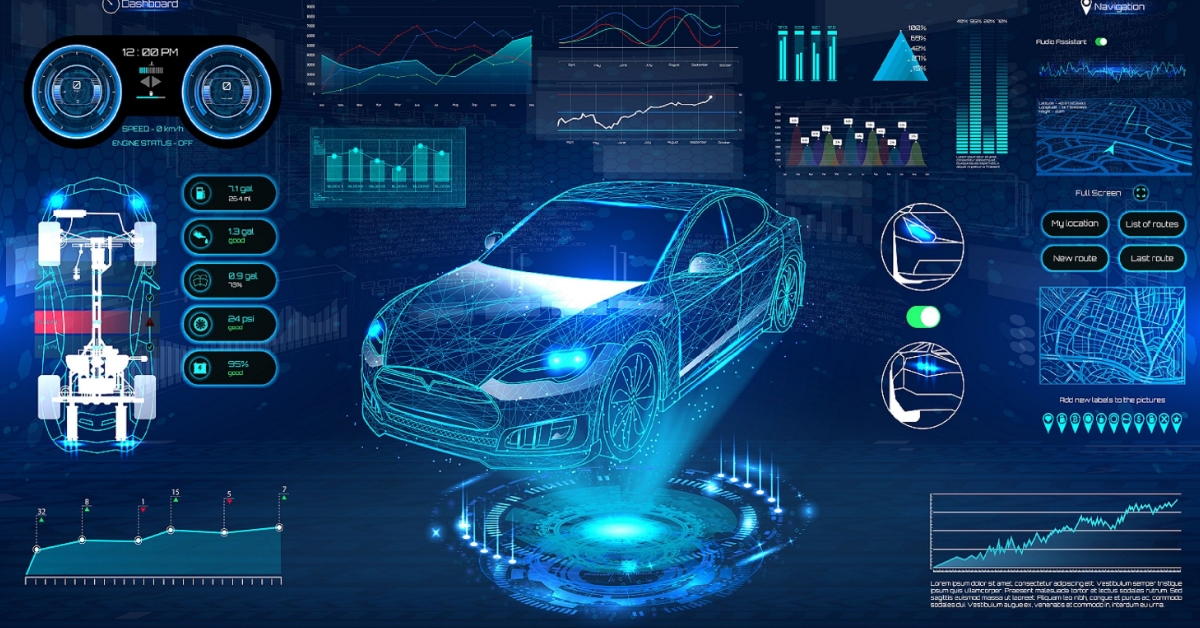
IoT-equipped vehicles can monitor their own performance and diagnose issues by themselves. Manufacturers receive real-time data about a car’s health. And this allows for proactive maintenance and even remote troubleshooting.
For instance, imagine a car’s engine detects a potential problem that can affect your car’s health in the long sun. Now, this IoT-enabled car can send an alert to the owner and the manufacturer. This way, the car’s problem is diagnosed and repaired on time, thus reducing its downtime.
2. Improved Safety
IoT does more than simply protect your car. IoT enables Advanced Driver Assistance Systems (ADAS) that can prevent accidents and enhance road safety.
With ADAS enabled, sensors and cameras detect potential collisions, lane departure, and pedestrian presence. Then, it provides alerts or even automatically applies brakes to prevent accidents. Consequently, IoT technology contributes to reducing accidents and saving lives.
3. Efficient Traffic Management
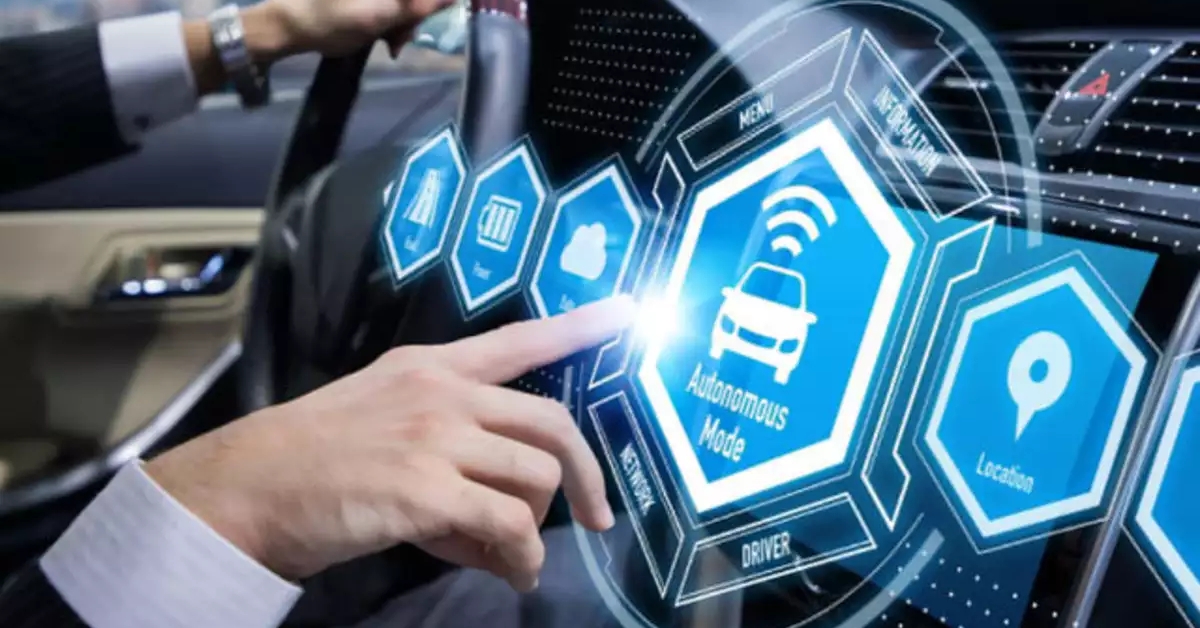
IoT-enabled vehicles can communicate with traffic infrastructure like traffic lights and road signs. This allows for real-time traffic management, optimized traffic flow, and reduced congestion.
For instance, adaptive traffic lights can adjust their timing based on traffic conditions, thus reducing waiting hours for drivers. This can be a big game-changer if you live in a metropolitan area.
4. Personalized Driving Experience
We can even call this a combination of IoT and machine learning. With IoT, your vehicle does more than what you ask for. It can collect data about the driver’s preferences, behavior, and habits.
And this data is then used to customize settings like preferences, seat positions, climate control, and entertainment options.
Over time, your car “learns” the driver’s preferences and adapts accordingly, thus creating a full-fledged personalized driving experience.
5. Environmental Sustainability
IoT-connected cars can contribute to easing the environmental impact of vehicles. Smart sensors can monitor fuel efficiency and emissions. This provides drivers feedback on optimizing their driving habits for better fuel economy.
Additionally, electric vehicles can leverage IoT technology to manage charging and grid interaction efficiently.
6. Better Fleet Management
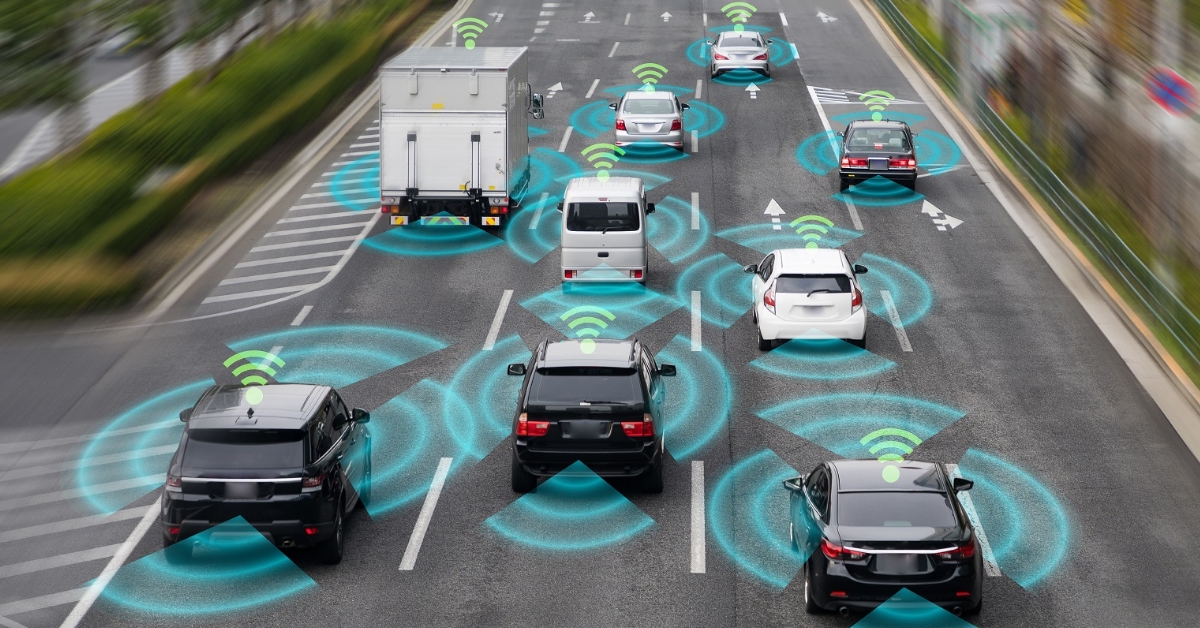
For businesses that rely on vehicle fleets, IoT solutions in fleet management offer streamlined operations. Everything is automated on an IoT-connected car, from maintaining the logistics to monitoring driver performance and complying with environmental and safety regulations. In addition, real-time data on vehicle location, performance, and maintenance needs can optimize routes, reduce fuel consumption, and enhance operational efficiency.
When connected to a reliable 5G, or 4G network, yan IoT-connected cars can trigger warning alerts for low battery, coolant temperature, or engine maintenance. Thus, IoT solutions for connected vehicle automate some of fleet management’s most resource-intensive processes and trip planning. Moreover, this helps the fleet management segment gain more customer satisfaction through on-time deliveries and high-quality service.
Recommended Reading
7. OTA Software Updates and Upgrades
OTA (Over-The-Air) updates are vital for IoT-connected vehicles. Just like your phone gets software updates, cars do too. These updates improve safety, fix bugs, and add new features without needing a visit to the mechanic.
It’s like giving your car a “brain boost” to stay secure and up-to-date. If roads change or new traffic rules come up, your car can learn about them.
OTA updates keep your car smart and safe. This way, you can ensure your car is at its best and stays connected to the latest advancements.
8. Self-Driving Vehicles
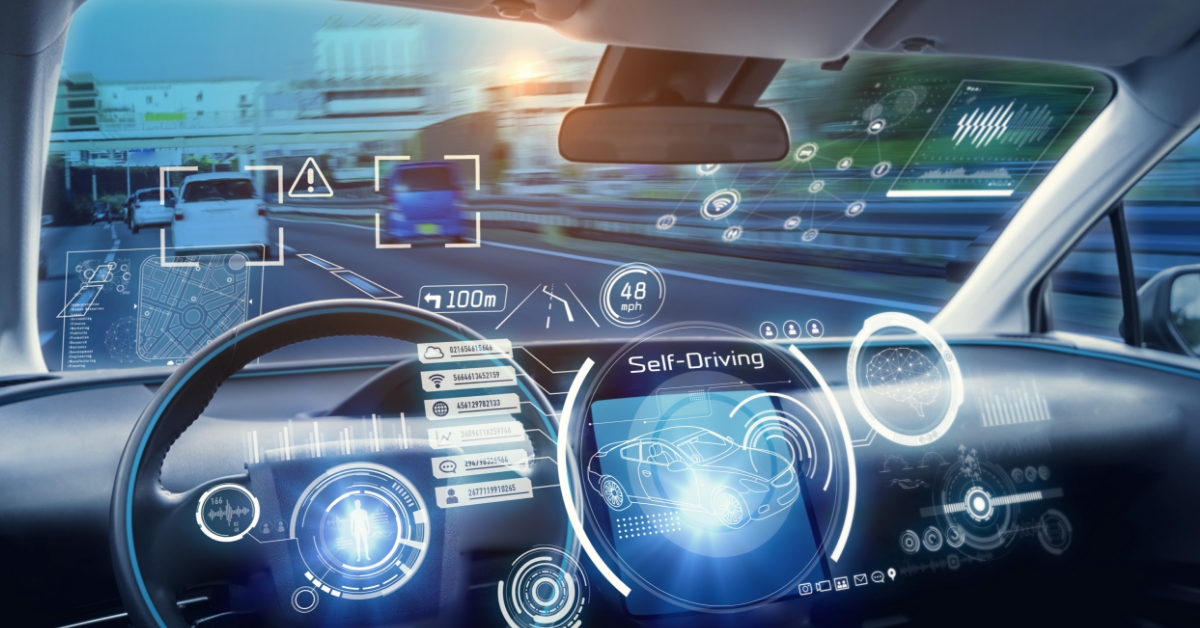
Connected cars in IoT can assist self-driving cars by connecting them to a network of smart devices and sensors. These devices then share real-time data about traffic, weather, road conditions, and nearby vehicles.
And this information helps self-driving cars make safer and smarter decisions, like adjusting speed and routes.
Automotive IoT also enables remote monitoring and updates for the car’s software, improving performance and safety over time.
9. Improved Vehicle Security
Auto IoT turns vehicles into vigilant guardians — preventing theft, notifying owners of incidents, and staying updated to ensure a super-safe driving experience.
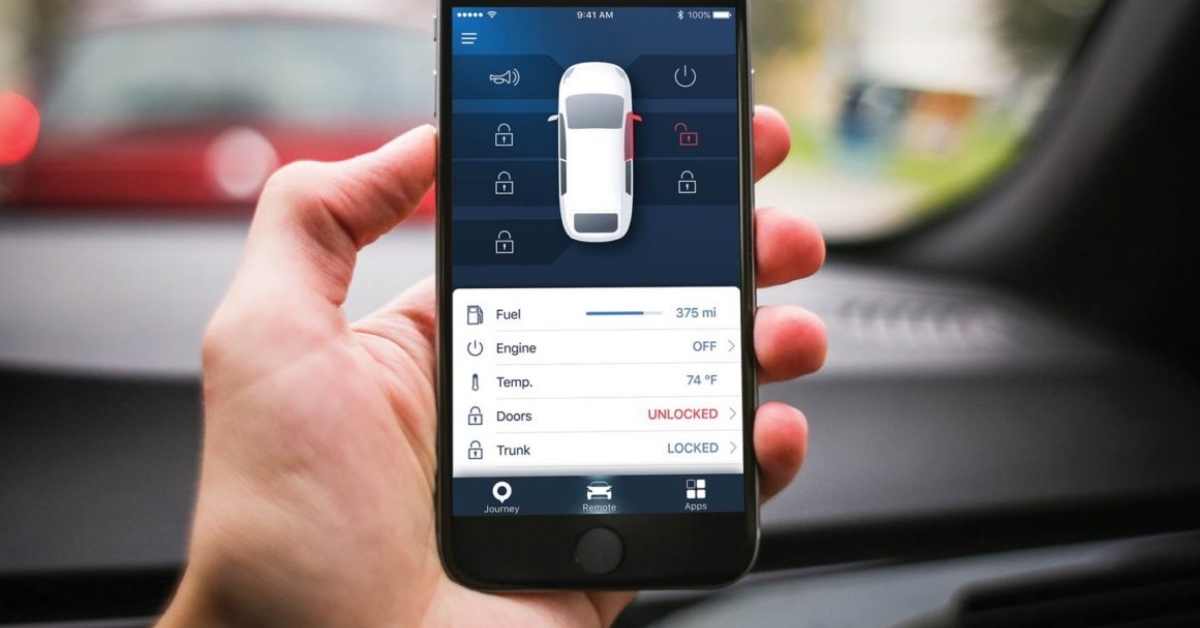
Vehicles linked with automotive IoT can detect and alert owners about break-ins, accidents, or unusual activity. And, in case of theft, real-time tracking helps recover the car. Apart from this, IoT enables remote locking, unlocking, and engine shutdown, reducing unauthorized access to a minimum.
Periodic software updates fix vulnerabilities, protecting your IoT smart cars from cyber threats.
10. High-Quality In-Vehicle Infotainment
An IoT-connected car improves the quality of in-vehicle infotainment by providing seamless access to a world of entertainment and information. Smart devices link to the car, offering music, podcasts, navigation, and more.
Auto IoT enables voice commands for hands-free control and real-time data updates to keep maps and services accurate. Passengers can stream content, play games, and connect to social media.
Tech giants, Google and Apple are teaming up with various car makers to bring IoT applications like in-vehicle infotainment to life.
For instance, Google collaborates with automakers to integrate Google Maps for navigation and Google Assistant for hands-free driving assistance.
Similarly, Apple offers CarPlay for advanced in-car entertainment. Now, your smartphone has become a control center for your vehicle. You can allow features like remote door locking, starting the engine, and more.
You can think of it like having a digital entertainment center on wheels – IoT ensures you’re entertained, informed, and connected while enjoying your ride.
The Future of IoT in the Automobile Industry
In the future, cars will become super smart with IoT. Like it or not, IoT-connected smart vehicles are here to stay.
They will talk to each other, with the traffic lights, and even to your home appliances. Imagine cars that drive themselves safely, find the best parking spots, and fix problems before you even notice. And that’s not everything.
With IoT, cars will know when they’re low on fuel or need a checkup.
They’ll make your trips smooth, find shortcuts, and keep you comfortable. Plus, they’ll help protect the planet by using energy better.
This paradigm shift will result in enhanced efficiency, smoother commutes, reduced environmental impact, and an overall elevated driving experience. In a nutshell, connected cars in IoT are all about encapsulating a synergy between technology, convenience, and sustainability.
If you already have an idea about automate your driving vehicle, Schedule a free demo and we’ll help you implement it!





The automotive industry’s embrace of IoT is a prime example of how technological innovation can reshape traditional sectors. From improving driver safety to optimizing supply chains in car manufacturing, IoT’s impact is far-reaching and promises a future where mobility is smarter than ever before.
I’ve always been intrigued by the concept of autonomous vehicles, and IoT is a crucial component of making them a reality. The constant communication between vehicles, infrastructure, and pedestrians is essential for ensuring safe and efficient self-driving experiences.
As someone who commutes daily, the insights provided in this article are very relevant. The real-time traffic updates and alternative route suggestions delivered through IoT-enabled navigation systems have saved me countless hours stuck in traffic. It’s amazing how technology is making our lives easier.
The security aspect of IoT in cars is something that often gets overlooked. With the increased connectivity, there are legitimate concerns about potential cyberattacks. However, it’s reassuring to know that the industry is actively working on robust cybersecurity measures to mitigate these risks.
This article provides a comprehensive overview of how IoT is reshaping the automotive sector. The concept of ‘smart cities’ can’t be fully realized without IoT-enabled vehicles that seamlessly interact with their surroundings. It’s a fascinating shift in the way we think about mobility.
The impact of IoT on the automotive industry goes beyond just convenience; it’s about sustainability too. The optimization of fuel consumption, emissions monitoring, and efficient route planning contribute to a greener and more eco-friendly transportation ecosystem.
I remember a time when the idea of cars communicating with each other and the traffic infrastructure was purely science fiction. But now, IoT has turned that fiction into reality. The potential for reducing traffic congestion and accidents through inter connected vehicles is mind-blowing.
This article highlights the incredible advancements brought about by IoT in the automotive realm. With features like connected cars, predictive maintenance, and even self-driving capabilities, IoT is shaping the future of transportation. The possibilities seem endless!
As a car enthusiast, I’ve been closely following the IoT trends in the automotive sector. It’s fascinating to see how IoT has enabled vehicles to become safer and more efficient. The ability to remotely monitor vehicle performance and receive timely maintenance alerts is truly a game-changer.
I couldn’t agree more with the points made in this blog! The integration of IoT in the automotive industry has completely revolutionized the way we perceive and use vehicles. From smart navigation systems to real-time vehicle diagnostics, IoT has undoubtedly enhanced the driving experience.
Hello, The integration of IoT in the automotive industry is truly revolutionary! The ways it enhances vehicle connectivity, from real-time diagnostics to predictive maintenance, are game-changers. Can’t wait to see how this continues to evolve and transform the driving experience.
The fusion of IoT and automotive technology is truly groundbreaking! I’m particularly intrigued by the concept of smart parking and traffic management systems. It’s amazing to witness how connected vehicles are not only transforming individual driving experiences but also reshaping the urban mobility landscape. Looking forward to more IoT innovations!
As someone passionate about road safety, the incorporation of IoT in connected vehicles is a massive leap forward. The advancements in collision detection, emergency response systems, and driver assistance technologies are making our roads safer. It’s encouraging to see technology making a positive impact on lives.
The intersection of IoT and automotive technology is reshaping the concept of mobility. From smart parking solutions to autonomous driving features, the possibilities seem limitless. Eagerly awaiting the continued evolution of connected vehicles and how they’ll redefine our experience on the road.
This article is an eye-opener! The integration of IoT in the automotive industry is revolutionary. The potential for connected vehicles is vast, from improving safety with real-time monitoring to enhancing the overall driving experience. Exciting times ahead for the automotive tech enthusiasts!
The impact of IoT on the automotive industry is truly fascinating! The way connected vehicles are transforming our driving experience and safety standards is groundbreaking. Looking forward to more innovations and developments in this space as IoT continues to shape the future of automotive technology.